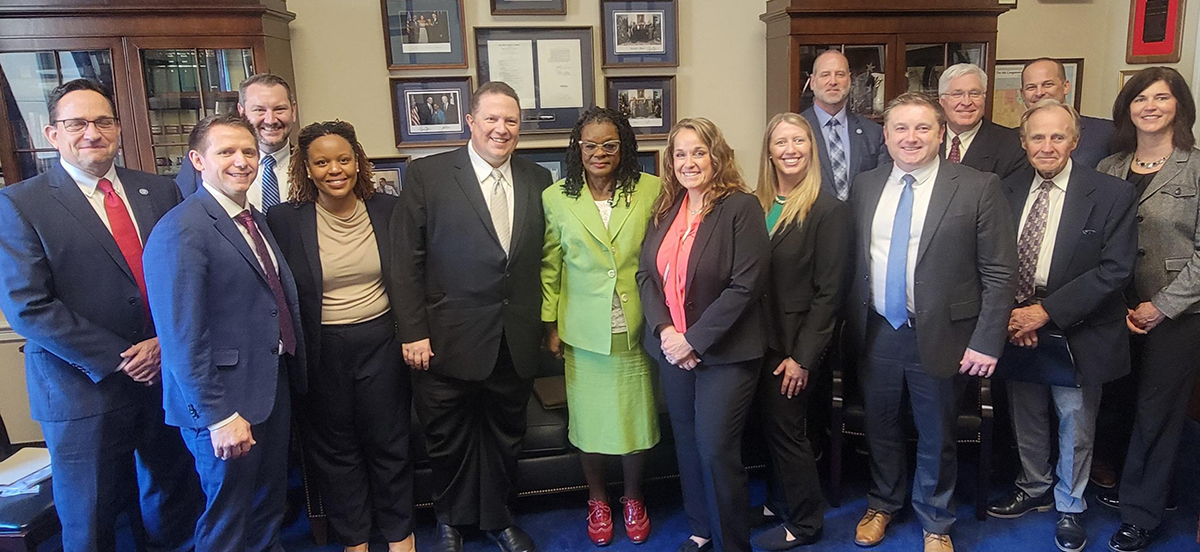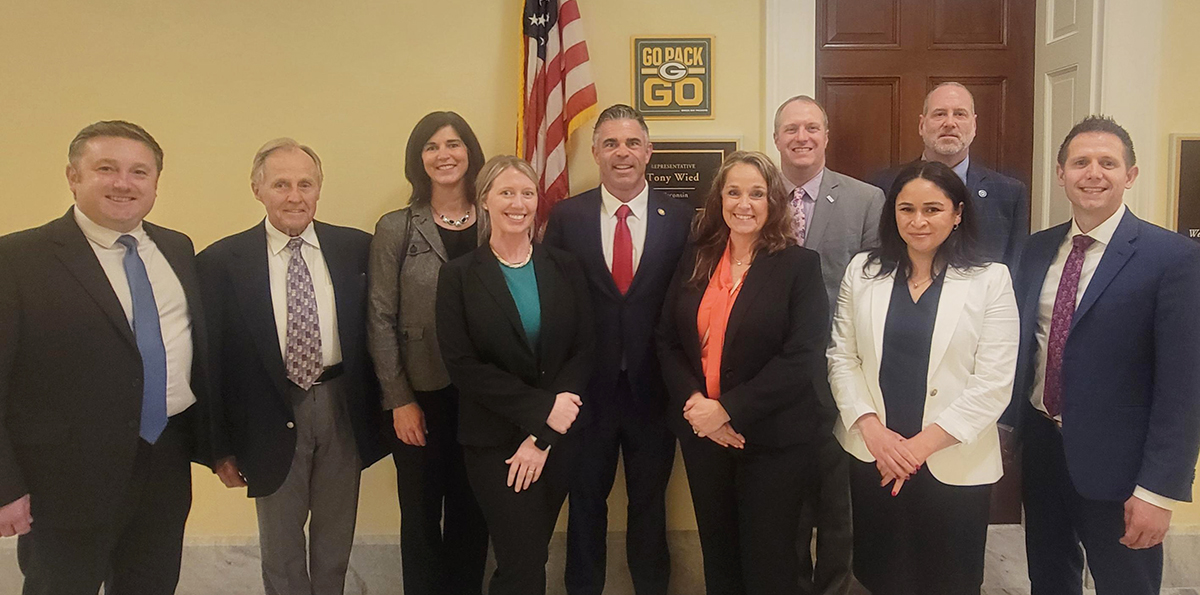Click here to view past issues
IN THIS ISSUE
- DOJ: Large Health Insurers Knowingly sent Illegal Kickbacks to Brokers and Discriminated Against Disabled
- WHA and Members Back in D.C. Urging Congress to Reject Cuts to Medicaid that would Harm Wisconsin
- Last Chance to Register for the 2025 Workforce Forum
- WHA-Crafted Training Grant Awards Grow WI GME
- We're More Than Health Care - Celebrating National Hospital Week May 11-17, 2025
- WHA Information Center Highlights Data Tools for Mental Health Month
EDUCATION EVENTS
Feb. 25, 2026
2026 Advocacy DayMar. 4, 2026
Spring 2026 Annual Survey TrainingMar. 5, 2026
Operational Vacancy: An Effective Tool for Workforce PlanningClick here to view education event calendar
View more issues of The Valued Voice
Sign Up for WHA's Newsletter
WHA and Members Back in D.C. Urging Congress to Reject Cuts to Medicaid that would Harm Wisconsin
The Wisconsin Hospital Association and leaders from hospitals and health systems from across the state traveled to Washington, D.C., to meet with Wisconsin’s congressional delegation on May 6.
Those participating included John Russell, Hannah Young, and Jaimie Hendrix of Prairie Ridge Health, Bob Van Meeteren of Reedsburg Area Medical Center, Derek Daly of Tomah Health, Mike Schafer of Spooner Health, Jerry Halverson, MD of Rogers Behavioral Health, Carina Marquez-Oberhoffner of Gundersen Health System, Brad Wolters of Marshfield Clinic Health System, Jessica Stauber of Aspirus Health System, Meagan Thompson of Aurora Health Care, Molly Haase of AdventHealth, Jeremy Levin of the Rural Wisconsin Health Cooperative, Bill McCollough of Partners of WHA and Eric Borgerding, Kyle O'Brien and Jon Hoelter of WHA.
 WHA and hospital leaders with Rep. Gwen Moore (center)
WHA and hospital leaders with Rep. Gwen Moore (center)
As Congress continues to debate how to find $880 billion in savings from the Energy and Commerce Committee, which has jurisdiction over Medicaid and Medicare spending, WHA's group of health care leaders urged Wisconsin's Congressional delegation to reject Medicaid cuts that would be harmful to Wisconsin. According to WHA’s analysis of state and federal data, Wisconsin ranks 12th lowest in the country in terms of federal spending per Medicaid beneficiary, suggesting Wisconsin taxpayers are not receiving their fair share of federal funds to support Wisconsin's Medicaid program. This has resulted in Wisconsin having some of the lowest Medicaid rates in the country.
"WHA is always looking for ways to help its members maintain and improve access to care by improving Medicaid rates," said WHA President and CEO Eric Borgerding. "Frankly, we could be severely restricted in our ability to do so if Congress chooses certain reforms that end up unfairly punishing Wisconsin. That's why it's so important that our Wisconsin delegation members stand up for Wisconsin as discussions in Congress progress."
 WHA and hospital leaders with Rep., Tony Wied (center)
WHA and hospital leaders with Rep., Tony Wied (center)
The group also expressed concern over the continued underfunding of hospital Medicare reimbursements as well as the impact prior authorization is having on increasing costs and bureaucracy in the health care system. (insert link to first attachment) Because Wisconsin has an aging population, more and more people are moving off commercial insurance and onto Medicare every day. With Wisconsin hospitals only receiving about 74% of what it costs them to provide care to Medicare patients; the statewide overall level of Medicare payments has grown 86% since 2016—from -$1.8 billion to -$3.3 billion in 2023. The problem is compounded by waste and losses hospitals receive from large Medicare Advantage insurers abusing the prior authorization process. WHA is urging Congress to reintroduce the Improving Seniors Timely Access to Care Act, legislation that would reform and streamline the prior authorization process in Medicare Advantage.
Lastly, WHA's group of health care leaders urged for Congress to introduce the Sustain 340B Act, which was introduced as draft legislation in the past Congress. This legislation would prohibit pharmacy benefit manager middlemen from discriminating against 340B hospitals by slashing their reimbursements just because they participate in 340B. It would also prohibit drug manufacturers from denying discounts at contract pharmacies. In exchange for codifying these reforms into federal law, 340B covered entities would be required to submit additional information to the federal government.
Contact WHA Vice President of Federal and State Relations Jon Hoelter with questions.
WHA and Members Back in D.C. Urging Congress to Reject Cuts to Medicaid that would Harm Wisconsin
The Wisconsin Hospital Association and leaders from hospitals and health systems from across the state traveled to Washington, D.C., to meet with Wisconsin’s congressional delegation on May 6.
Those participating included John Russell, Hannah Young, and Jaimie Hendrix of Prairie Ridge Health, Bob Van Meeteren of Reedsburg Area Medical Center, Derek Daly of Tomah Health, Mike Schafer of Spooner Health, Jerry Halverson, MD of Rogers Behavioral Health, Carina Marquez-Oberhoffner of Gundersen Health System, Brad Wolters of Marshfield Clinic Health System, Jessica Stauber of Aspirus Health System, Meagan Thompson of Aurora Health Care, Molly Haase of AdventHealth, Jeremy Levin of the Rural Wisconsin Health Cooperative, Bill McCollough of Partners of WHA and Eric Borgerding, Kyle O'Brien and Jon Hoelter of WHA.
 WHA and hospital leaders with Rep. Gwen Moore (center)
WHA and hospital leaders with Rep. Gwen Moore (center)
As Congress continues to debate how to find $880 billion in savings from the Energy and Commerce Committee, which has jurisdiction over Medicaid and Medicare spending, WHA's group of health care leaders urged Wisconsin's Congressional delegation to reject Medicaid cuts that would be harmful to Wisconsin. According to WHA’s analysis of state and federal data, Wisconsin ranks 12th lowest in the country in terms of federal spending per Medicaid beneficiary, suggesting Wisconsin taxpayers are not receiving their fair share of federal funds to support Wisconsin's Medicaid program. This has resulted in Wisconsin having some of the lowest Medicaid rates in the country.
"WHA is always looking for ways to help its members maintain and improve access to care by improving Medicaid rates," said WHA President and CEO Eric Borgerding. "Frankly, we could be severely restricted in our ability to do so if Congress chooses certain reforms that end up unfairly punishing Wisconsin. That's why it's so important that our Wisconsin delegation members stand up for Wisconsin as discussions in Congress progress."
 WHA and hospital leaders with Rep., Tony Wied (center)
WHA and hospital leaders with Rep., Tony Wied (center)
The group also expressed concern over the continued underfunding of hospital Medicare reimbursements as well as the impact prior authorization is having on increasing costs and bureaucracy in the health care system. (insert link to first attachment) Because Wisconsin has an aging population, more and more people are moving off commercial insurance and onto Medicare every day. With Wisconsin hospitals only receiving about 74% of what it costs them to provide care to Medicare patients; the statewide overall level of Medicare payments has grown 86% since 2016—from -$1.8 billion to -$3.3 billion in 2023. The problem is compounded by waste and losses hospitals receive from large Medicare Advantage insurers abusing the prior authorization process. WHA is urging Congress to reintroduce the Improving Seniors Timely Access to Care Act, legislation that would reform and streamline the prior authorization process in Medicare Advantage.
Lastly, WHA's group of health care leaders urged for Congress to introduce the Sustain 340B Act, which was introduced as draft legislation in the past Congress. This legislation would prohibit pharmacy benefit manager middlemen from discriminating against 340B hospitals by slashing their reimbursements just because they participate in 340B. It would also prohibit drug manufacturers from denying discounts at contract pharmacies. In exchange for codifying these reforms into federal law, 340B covered entities would be required to submit additional information to the federal government.
Contact WHA Vice President of Federal and State Relations Jon Hoelter with questions.
IN THIS ISSUE
- DOJ: Large Health Insurers Knowingly sent Illegal Kickbacks to Brokers and Discriminated Against Disabled
- WHA and Members Back in D.C. Urging Congress to Reject Cuts to Medicaid that would Harm Wisconsin
- Last Chance to Register for the 2025 Workforce Forum
- WHA-Crafted Training Grant Awards Grow WI GME
- We're More Than Health Care - Celebrating National Hospital Week May 11-17, 2025
- WHA Information Center Highlights Data Tools for Mental Health Month

